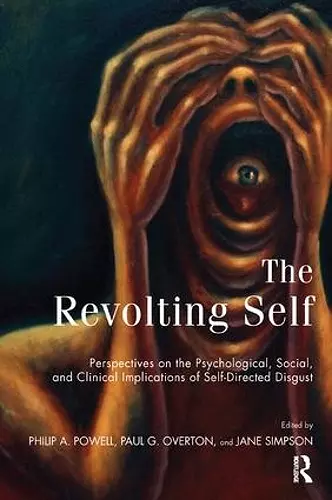The Revolting Self
Perspectives on the Psychological, Social, and Clinical Implications of Self-Directed Disgust
Jane Simpson editor Philip A Powell editor Paul G Overton editor
Format:Paperback
Publisher:Taylor & Francis Ltd
Published:13th Mar '15
Currently unavailable, and unfortunately no date known when it will be back
This paperback is available in another edition too:
- Hardback£135.00(9780367328665)

This insightful exploration of self-disgust in The Revolting Self highlights its psychological significance and implications for mental health and physical functioning.
In The Revolting Self, the authors delve into the complex phenomenon of self-directed disgust, exploring its implications for psychological experiences and potential psychopathology. This concept, which involves viewing oneself as an object of abhorrence, is gaining recognition in the clinical field, yet remains relatively underexplored in psychological research. The edited collection presents a comprehensive examination of self-disgust, highlighting its significance in various domains, including chronic health issues and sexual dysfunction.
The volume features contributions from leading scholars and practitioners in psychology, offering a rich tapestry of insights that combine empirical research, theoretical exploration, and social commentary. By addressing self-disgust from multiple perspectives, The Revolting Self aims to illuminate how this emotion can influence mental health and physical well-being. Each chapter is crafted by experts who are not only pioneers in their respective fields but also recognize the potential of self-disgust as a valuable lens for understanding broader psychological phenomena.
As an invaluable resource for academics and clinicians alike, this collection serves as a timely investigation into what the authors describe as 'the revolting self.' It encourages readers to engage with this important yet often overlooked aspect of human psychology, fostering a deeper understanding of how self-disgust can shape our experiences and interactions with the world around us.
'This authoritative book provides the reader with a comprehensive overview of the current state of theory and research on self-disgust. This is a topic of great importance for psychopathology that has just begun to stimulate significant research interest. In addition to consideration of an evolving theoretical formulation, the book's key strength is that it offers the reader a transdiagnostic framework for conceptualising how self-disgust may be observed across various disorders. The editors have assembled a stellar group of contributors who offer unique perspectives on the revolting self. This book will be an important resource for scientists or students who want to gain a better understanding of the many ways that experiencing disgust may contribute to psychiatric disorders.'- Bunmi O. Olatunji, PhD, Department of Psychology, Vanderbilt University, USA'Our emotions, especially our social or self-referential emotions, are of great importance for our lives: they guide us on our long and uncertain journey in a world mainly determined by the behaviour of other people. In order to effectively navigate under these conditions, our emotional dispositions need social programming. We have to acquire and to calibrate affective schemas that allow for culturally acceptable and intelligible ways of establishing an "emotional self". In comes the concept of "self-directed disgust". This describes how an emotional core-process is socially transformed in order to balance our selves between self-expansion and self-regression. Too little self-disgust may lead to exorbitance, impertinence, and social ostracism; too much strangles the development of a viable self and ends up in chronic psychopathology. I hope that clinical research on this subject will help us to develop more effective psychotherapeutic strategies. Meanwhile, I welcome the first volume on the topic. The Revolting Self is a timely and very interesting read that should find a big audience.'- Markus R. Pawelzik, MD, Medical Director, EOS-Klinik, Munster, Germany'Disgust is considered to be one of the most basic of emotions, and our experience of it nearly ubiquitous. Beyond revulsion against disease and contamination from physical threats, much work in recent decades has helped clarify disgust's role as a complex socio-moral emotion. This exciting volume advances our understanding by exploring when we turn our disgust inward, towards our very selves. With ample evidence and thought-provoking theorising, the chapters here first and foremost put to rest the longdebated question of whether self-disgust can be said to exist as an emotional experience. The authors promote disgust towards the self to its rightful place alongside, yet distinct from, other evaluative and self-conscious emotions like shame, guilt, and anger, and demonstrate myriad significant health consequences of self-disgust across domains and populations. This rich collection is sure to enhance the scholarship, teaching, and practiceof a great many of us working in the psychology and philosophy of emotions.'- Tomi-Ann Roberts, PhD, Chair, Department of Psychology, Colorado College, USA
ISBN: 9781782200086
Dimensions: unknown
Weight: unknown
368 pages